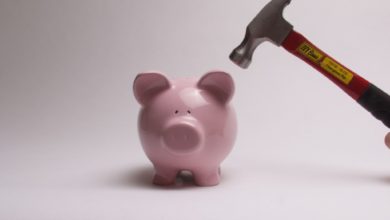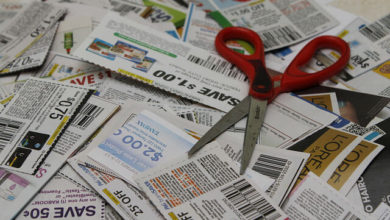How To Break Bad Financial Habits and Live Your Ideal Life
We all have bad habits. Personally, I crack my knuckles when I am nervous. It has become so natural for me that I don’t even realize when I am doing it. When I was preparing for a job interview and my sister was interviewing me, she said that my knuckle cracking was annoying. I didn’t even know I was doing it! When the interview came, I cracked my knuckles once. I heard the crack at the beginning of the interview and remembered what my sister said.
While knuckle cracking, nail biting and talking with a mouthful of food are all bad habits you should correct, I want to talk about the importance of overcoming bad financial habits. Having bad financial habits can cause us to stop thinking positively, become depressed and not live life to the fullest. I know because after I graduated from college, I got myself into $10,000 worth of credit card debt. I was depressed and buying things made me feel good. But that high was temporary and began to fade faster and faster with each additional purchase I made. I didn’t realize it until one day when I had my ah-ha moment. When I became honest with myself, I was able to overcome my bad financial habit and get over my depression. This allowed me to start living life again.
If you have bad habits, financial or otherwise, here is a step-by-step plan to help you overcome them so that you too can be happier and look forward to the life you have ahead of you.
Identify Your Bad Habits
Before you can correct your bad financial habits, you have to know what they are. Maybe you do know: you aren’t saving for retirement or you live beyond your means. In some cases, you may not know. At first, I didn’t realize I had a spending problem. I was spending money, but I was oblivious to it. It sounds odd in retrospect, but for those that have or are going through the same thing, you can commiserate.
Therefore, what are you bad financial habits? Is it not saving enough money, not paying bills on time, relying on credit cards for cash back and rewards, or maybe overspending? Whatever it is, you need to identify the habit. Once you do this, you can move onto the next step.
Be Accountable
Once you identify your bad financial habits, you need to be accountable for changing the habit. You need to be accountable to yourself first, but also to others. When you are accountable to yourself, you can rely on you to do the right thing. To help me stop my overspending, I took a picture of all of the things I bought piled on my bed. I carried this picture around with me and whenever I was about to buy something, I would pull that picture out. It reminded me of what I did and helped to curb my spending.
However, there are times we have our moments. No matter how accountable we are to ourselves, we can still talk ourselves into things. This is why you need a friend or family member to be accountable to as well. You can lean on them in times of weakness and they will help you stay on track.
Focus On One Habit At A Time
We tend to try to change or fix everything at once. Because we try to do too much, we become overwhelmed and fail on most of these things. Look at the resolutions you make every year. How many are you successful with? My guess is not many. The reason is because we try to change too many things at once. While it doesn’t sound like much work to start flossing your teeth every day, eating healthy, working out three times per week and read a book a month, it really is.
The solution is to focus on one bad habit at a time. Start out with monitoring your spending by setting up a budget. Once you do this for a couple of months and have a good handle on it, then introduce saving more money into the picture. it’s not the end of the world if you put off fixing bad habits a month or so while you focus on others. Doing this will only increase your odds of overcoming them all.
Set Goals
With the above said, you still need to set goals. In order to set goals, sit down and list all of the bad habits you want to overcome. Then think about how long it will take you to change. Be reasonable with your goals. Most experts suggest that it takes 21 days to form a new habit. So if you think you can stop biting your nails or change your overspending ways in a week, you are most likely wrong.
I suggest you look at one to two month’s time for overcoming a bad habit. This allows you time to create the habit and then change or modify things to better your chances of success. It also takes into account setbacks.
Accept Setbacks
No one is perfect, so thinking that you won’t have any setbacks in your quest to change your bad habits is wrong. You will have setbacks. The key is to accept these setbacks. Don’t be afraid to fail. Failing is a part of life and should be looked at as a positive thing, not a negative thing as long as you learn from your failures.
When I was trying to overcome my out of control spending, even after looking at my picture, I still bought some things I didn’t need. I could have felt sorry for myself and given up. But I accepted that I failed and looked into why I did so. In one instance, I learned that I bought shirt because I was going to a party that weekend. I learned that I needed to take note of upcoming events and realize that I didn’t need a new shirt or shoes for the event, what I had was plenty good.
Final Thoughts
Overcoming bad habits isn’t an easy thing to do. But if you decide that you want to live a better life, a healthier life, then you will be steadfast in your determination of overcoming your bad habits and increase the odds of success. The steps I outlined above will help get you the majority of the way to overcoming your bad habits, but you will still need to have a positive thought process as well. The benefits of positive thinking are immeasurable. The sooner you change your thought pattern into a more positive one, the quicker you will begin to see positive changes in your bad habits.
Don writes for Breath of Optimism , a blog that focuses on positive thinking and how your thoughts help you to be the best person you can be. He recently released his eCourse, 30 Days to Positive Thinking , which helps people take control of their thoughts and begin to think more positively.





I know I need to work on accepting setbacks. I get really down on myself sometimes – I know I need to be more positive and focus on everything I’ve done well or achieved, instead of dwelling on the stuff that didn’t go so well.
It’s certainly not easy to accept setbacks. But you have to make it a point to change the negativity of setbacks into a positive. The more you can focus on the positive, the better off you will be.
My bad financial habit is letting money slip through the cracks unnoticed. I really don’t think I spend that much on food and alcohol until I sit down and add it all up. Little trips here and there add up to a lot of money! It’s a constant battle, but I’m working on it.
Keeping tabs on your spending is the best way to overcome this. You could also make note, through a picture or saying that will help you to stop and think for a minute when you are buying food and/or alcohol. That will help you to remember all of the other times you spent money on these things and will hopefully help you cut back some of the spending.
I find that public accountability helps me most. The more people who know what I’m trying to do, the more I feel responsible to myself AND them. Plus it creates a larger support network cheering me on to reaching my goal.
This is so true. I used to think that spending money made me happy – and it did, but only temporary. Being debt free is so much more rewarding than anything I could ever buy.